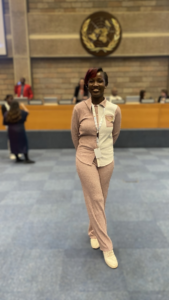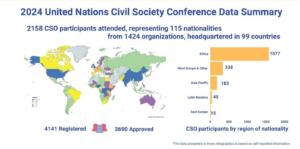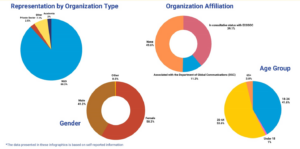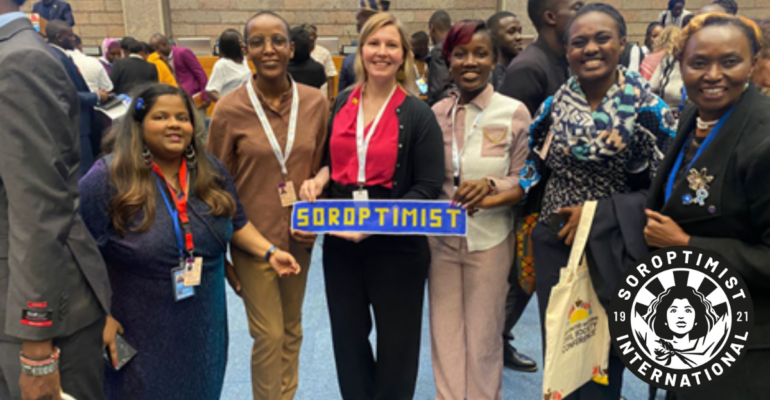Blog of Ruhiyih Temko, Young Soroptimist, alongside Mary Muia, SI UN Representative Nairobi.
Have you ever thought about the pivotal moments in your youth that shaped who you are today? Who was the mentor who held your hand and guided you through the challenges, especially as a woman striving to make your mark? How can we collaborate across generations to ensure a sustainable and equitable future for all? Reflecting on these questions, I found myself deeply inspired at the United Nations Civil Society Conference (UNCSC). Attending this event as a youth and women representative, I witnessed firsthand the incredible power of empowerment, mentorship, networking, and collective action in driving positive change.

Ruhiyih Temko – Young Soroptimist Tawi e Club, Kenya
The Significance of Networking and Mutual Support
One of the most striking aspects of the conference was the emphasis on networking and the power of mentorship. Almost every young person I met, from different countries had reached this point through the guidance and support of a mentor. This highlighted the importance of building connections and uplifting one another in our personal and professional journeys. I had the opportunity to engage with inspiring individuals who generously shared their experiences and insights.
Mentorship plays a crucial role by providing guidance, support, and opportunities for young people to develop their confidence and skills. Mentors can offer valuable advice, open doors to new opportunities, and help youth navigate challenges, thereby empowering them to take on leadership roles and make their voices heard.
These interactions reinforced the idea that success is not a solo endeavour but a collective effort fueled by mutual support and encouragement.

Image: Self-Reported Information from the UN
The Power of Collective Action
The conference, where attendees from all corners of the globe converged, underscored the power of collective action. The demographics data summary revealed a diverse representation, showcasing individuals from various countries, backgrounds, and age groups. There was a high representation in the forum from the youth which was very encouraging.

Self-Reported Information from the UN
Regardless of geographical location, cultural background, or socioeconomic status, we recognised the universal nature of the challenges faced. This acknowledgment fostered a sense of solidarity and empathy, prompting meaningful dialogue and collaboration towards finding solutions. Through mutual support and collective action, participants united in their commitment to upholding human rights, promoting equality, and advancing social justice, reaffirming the notion that, despite our differences, we are all interconnected in the pursuit of a better world.
Empowerment Through Participation
Witnessing the active participation of women and youth at the conference was incredibly encouraging and motivating. Seeing women and young people voice their opinions, contribute to discussions, and play significant roles in shaping policy and decision-making processes gave me hope for the future. The representation of these groups at such a high level demonstrated that our voices matter and that we can indeed make a difference. The women I encountered at the conference were particularly inspiring, showing that with determination and persistence, it is possible to achieve great things.
It is also important to note that young people can leverage resources such as mentorship programs, online courses, networking events, and platforms like the youth forums to gain knowledge, build connections, and develop the skills needed to drive change. Utilising social media and digital tools to spread awareness and mobilise others is also crucial. Resources should also be made available to the youth to enable them to access such spaces.

Key Thematic Areas
The conference served as an incredible platform to learn, unlearn and contribute to the development and improvement of various critical global issues. The main areas of focus included:
>>> Sustainable Development and Financing for Development:
Discussions highlighted the urgent need for sustainable development practices and innovative financing mechanisms to support global development goals. The conference underscored the importance of integrating environmental sustainability with economic growth, ensuring that development is inclusive and benefits all sections of society.
>>> International Peace and Security:
The sessions on peace and security emphasised the significance of global cooperation in maintaining international stability. With ongoing conflicts and emerging threats, the need for effective conflict resolution and peacebuilding initiatives was stressed. Data presented at the conference showed that regions with active civil society engagement tend to experience more sustainable peace processes. However, there needs to be more input from the member states to bring about peace.
>>> Science, Technology, and Innovation and Digital Cooperation (The Global Digital Compact):
The Global Digital Compact discussions focused on harnessing the potential of digital technologies for social good. The conference highlighted the role of science and technology in addressing global challenges, from climate change to healthcare. Accessibility is also very crucial. It also stressed the importance of digital cooperation to bridge the digital divide and ensure equitable access to technological advancements.
>>> Youth and Future Generations (The Declaration on Future Generations):
The conference placed significant emphasis on empowering youth and securing a better future for upcoming generations. The Declaration on Future Generations was discussed, highlighting the need to prioritise youth in policymaking and ensure their active participation in shaping the future. Statistics presented showed that youth engagement in civic activities leads to more dynamic and responsive governance.
The key challenges include lack of access to decision-making platforms, limited resources, and sometimes not being taken seriously. However, opportunities lie in increasing access to education, providing platforms for youth engagement, and fostering partnerships that amplify young voices in policy-making. We can also bridge generational gaps by fostering inclusive environments where all voices are valued, promoting intergenerational dialogue, and creating opportunities for collaboration between different age groups.
To ensure that the engagement of young people in initiatives like the Pact for the Future leads to tangible and lasting impacts, it is essential to incorporate youth feedback into actionable policies, provide continuous support and resources, and establish mechanisms for monitoring and evaluating the outcomes of youth-led initiatives.
>>> Transforming Global Governance:
Transforming global governance to be more inclusive and responsive to contemporary challenges was a key theme. The discussions called for reforms in international institutions to better reflect the diverse needs and voices of the global population. Data indicated that inclusive governance models tend to be more effective in addressing complex global issues.
Conclusion
The United Nations Civil Society Conference was a transformative experience, highlighting the importance of networking and mentorship, the value of understanding and contributing to bettering global issues, the empowerment that comes from active participation, and the power of collective action. It demonstrated that everyone has the potential to make a difference, and together, a better future for all can be created. The insights gained from the conference reinforce a commitment to contributing to positive change and empowering others within communities and beyond

